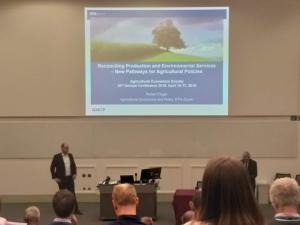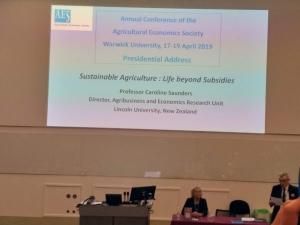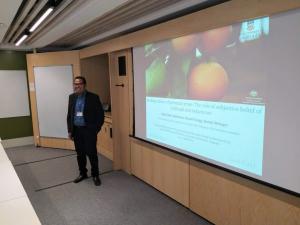Insights from the 93rd Agricultural Economics Society (AES) annual conference
GFAR PhD student Abdul Hasibuan recently attended the 93rd Agricultural Economics Society (AES) Conference held at University of Warwick, UK. In today’s blog Abdul talks about his experience of attending the conference.
The 93rd Agricultural Economics Society (AES) Conference annual conference, 15 – 17 April 2019 in Warwick University I attended covered various topics in agricultural economics such as food security, technology adoption, commodity process, agricultural trade, food resilience, methodology, risk, rural development, climate change, sustainability and agri-environment, and others (Details of the conference can be found here). Since my research focuses on climate risk in small-scale farming system and technology adoption with the case of small-scale citrus farmers in Indonesia, this conference provided a big opportunity for fruitful, constructive and inspirational discussion and feedback. This conference also explicitly intended to support early-career researchers including PhD students.
The 2019 conference was attended by hundreds of participants from around the globe and invited some important speakers. Prof. Robert Finger from ETH Zurich featured a keynote session about ‘Reconciling production and environmental services – New pathways for agricultural policies’. In the presentation, Professor Finger also delivered a discussion about the opportunities of digitalisation for agricultural policy design and increasing the performance of environmental and economic research. The digitalisation could help with monitoring, measuring outcomes and allows new types of interaction between farmers and other stakeholders. Presidential address by Prof. Caroline Saunders from Lincoln University, New Zealand discussed ‘Sustainable agriculture: Life beyond subsidies’ with the case of New Zealand. Professor Saunders highlighted that agricultural economics is a broad discipline, involving a wide range of knowledge and areas over a long period, including its consideration of environmental and social sustainability.
An interesting plenary session ‘Methodological approaches in agricultural economics – discussing the pros and cons of orthodoxy and heterodoxy in teaching, research and practice’, chaired by Prof. Janet Dwyer from Countryside and Community Research Institute (CCRI) University of Gloucestershire, invited three speakers from various backgrounds, Prof. Gianluca Brunori (Università di Pisa), Prof. David Harvey (Newcastle University and Editor of the Journal of Agricultural Economics) and Dr. Jonathan Brooks (Head of the Agri-Food Trade and Markets, OECD). The discussion highlighted that diversity of methodology in agricultural economics is needed in order to enhance the role of this discipline and attract more people to learn agricultural economics. A masterclass on Spatial Econometrics led by Dr. Doris Laepple from the National University of Ireland – Galway was held on the last day of the conference. She explained the details and application of spatial econometrics to analyse the spatial interaction effect among geographical units such as region, state, individual, firm, etc.
I presented a contributed paper titled ‘Seedling variety choices of perennial crops: The role of subjective belief of yield and risk behaviours’. This paper is co-authored by Dr. Daniel Gregg and Prof. Randy Stringer. During the session, I had several important discussions and suggestions for my paper from the audience. After the session, I had a fruitful discussion with Professor Deb Roberts and she suggested to emphasise the role of climate-related variable on the seedling choices in my analysis.
Finally, I would like to thank the Research Travel Scholarship and the Centre for Global Food and Resources (GFAR) for giving me the opportunity and funding to attend the conference. Also, many thanks to Australian Centre for International Agricultural Research (ACIAR) IndoHort project for funding my research project presented in the conference. This conference has given me more knowledge, information and confidence and broader network which are very important for my future career development. Also, many thanks should go to my supervisor, Prof. Randy Stringer and Dr. Daniel Gregg for their support, advice and guidance.



